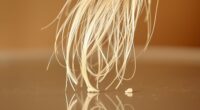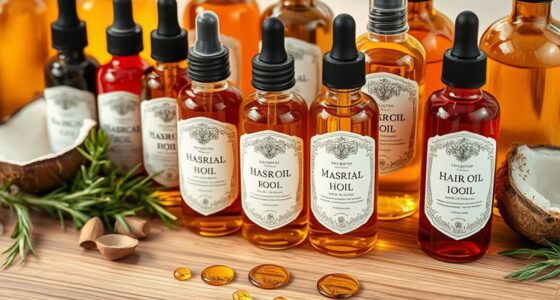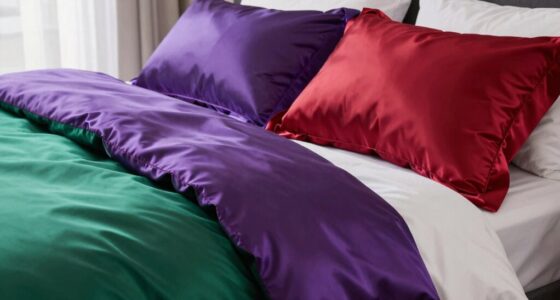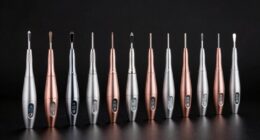Your scalp’s microbiome, composed of bacteria and fungi, plays a crucial role in keeping it healthy and balanced. When this ecosystem is disrupted, harmful microbes like Malassezia and certain bacteria can overgrow, causing inflammation, irritation, and dandruff. Maintaining microbial diversity through gentle products and proper hygiene supports beneficial microbes that fight off pathogens. By nurturing this natural balance, you can reduce dandruff and boost scalp health—discover more insights to protect your scalp’s well-being.
Key Takeaways
- A balanced scalp microbiome maintains healthy oil production and protects against pathogens that cause dandruff.
- Microbial imbalance, including overgrowth of Malassezia fungi and harmful bacteria, triggers inflammation and flaking.
- Beneficial bacteria help suppress harmful microbes, reduce inflammation, and support scalp barrier integrity.
- Proper scalp hygiene and microbiome-friendly products promote microbial diversity and scalp health.
- Using probiotics and prebiotics can restore microbial balance, alleviating dandruff and preventing scalp issues.
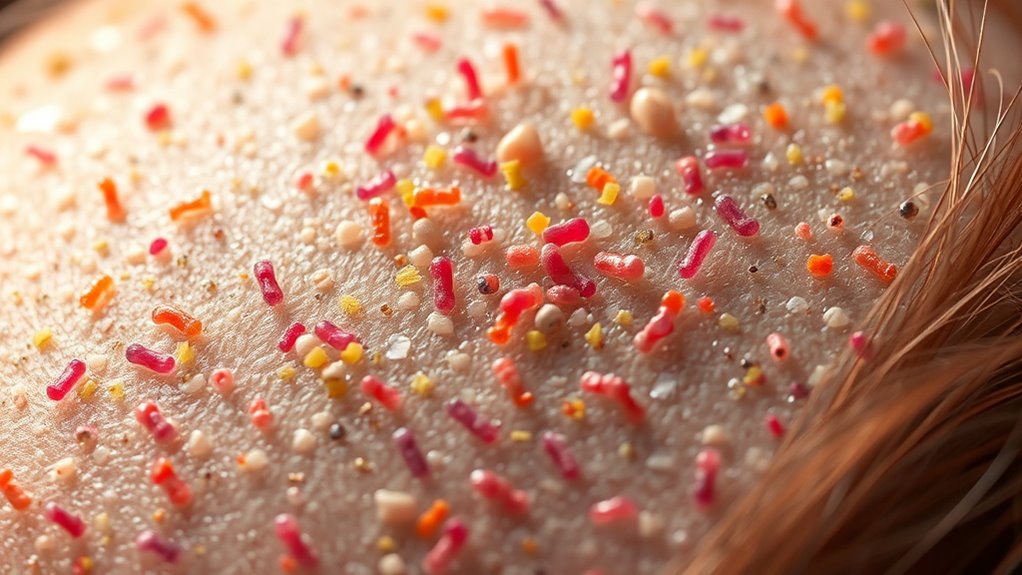
The health of your scalp largely depends on the diverse community of microorganisms that reside there, known as the scalp microbiome. This ecosystem includes bacteria, fungi, and other microbes that work together to keep your scalp balanced and healthy. When this balance is disrupted, it can lead to common scalp issues like dandruff. Understanding how scalp bacteria influence dandruff causes gives you insight into how your scalp functions and how to maintain its health.
Your scalp bacteria play an essential role in protecting your skin from harmful pathogens, regulating oil production, and maintaining the skin’s natural barrier. When the balance of these microorganisms is thrown off, certain bacteria can overgrow, contributing to inflammation, irritation, and flaking. For example, an overgrowth of Malassezia, a fungus, is often linked to dandruff, but bacteria also influence this process. Specific bacteria, such as *Propionibacterium* and *Staphylococcus*, can become predominant when the microbiome is disrupted, further aggravating dandruff causes. These bacteria can produce irritants or enzymes that damage scalp cells, leading to increased shedding and itchiness.
Dandruff causes aren’t solely due to fungi like Malassezia; bacterial imbalances also play a significant role. An excess of certain bacteria can trigger immune responses, causing scalp inflammation and scaling. When your scalp produces too much oil, it creates an environment where harmful bacteria thrive, exacerbating dandruff issues. This is why greasy scalp conditions often accompany dandruff — excess oil fosters bacterial overgrowth, which worsens flaking and irritation.
Keeping your scalp microbiome healthy is essential for preventing dandruff. Proper hygiene, balanced washing routines, and avoiding harsh chemicals help maintain microbial diversity. Using gentle, microbiome-friendly shampoos can help support the beneficial bacteria that keep your scalp in check. When the microbiome is in harmony, scalp bacteria work to suppress harmful microbes, reducing inflammation and dandruff severity. Conversely, neglecting scalp health or overusing aggressive products can wipe out good bacteria, allowing problematic bacteria to dominate and cause dandruff.
Furthermore, research shows that the use of probiotics and prebiotics in scalp care routines can help restore microbial balance and reduce dandruff symptoms, emphasizing the importance of a healthy microbiome. In essence, understanding the role of scalp bacteria in dandruff causes highlights why a healthy microbiome is essential for scalp health. By fostering a balanced microbial environment, you can reduce inflammation, control oil production, and prevent the conditions that lead to dandruff. Focusing on gentle, microbiome-supporting scalp care helps keep your scalp resilient and less prone to flaking, itchiness, and irritation. Taking care of your scalp microbiome isn’t just about hygiene; it’s about nurturing the diverse community of microorganisms that keep your scalp healthy and free from dandruff.
Frequently Asked Questions
Can Probiotics Improve Scalp Microbiome Balance?
Yes, probiotics can improve your scalp microbiome balance. By introducing specific probiotic strains, you help restore healthy scalp flora, reducing dandruff and irritation. These beneficial bacteria compete with harmful microbes, supporting scalp health. Using probiotic-based shampoos or supplements encourages a balanced microbiome, which can lead to fewer scalp issues and a healthier appearance. Incorporate probiotics into your routine to support your scalp’s natural defenses and maintain ideal scalp health.
How Does Diet Influence Scalp Microbial Diversity?
The diet impact on your scalp’s microbial diversity is significant. When you eat nutrient-rich foods, you give your skin and scalp beneficial microbes what they need to thrive. Conversely, a diet high in sugar and processed foods can decrease microbial diversity, leading to imbalance and dandruff. To support healthy scalp microbiome, focus on a balanced diet with plenty of fruits, vegetables, and healthy fats, promoting ideal microbial diversity.
Are There Natural Remedies to Modify Scalp Bacteria?
While modern solutions often focus on chemicals, natural remedies offer a invigorating alternative to modify scalp bacteria. Herbal remedies and essential oils can balance your scalp’s microbiome, fighting dandruff and irritation naturally. Tea tree oil, for instance, has antimicrobial properties that target bacteria without harsh effects. By incorporating these into your routine, you nurture your scalp’s health, blending nature’s wisdom with effective care.
What Is the Connection Between Stress and Scalp Microbiome?
Stress impact can considerably alter your scalp microbiome, reducing its diversity and making it more vulnerable to imbalances. When you’re stressed, your body releases hormones that can disrupt the natural balance of bacteria on your scalp, leading to issues like dandruff or dryness. Managing stress through relaxation techniques or lifestyle changes helps maintain microbiome diversity, supporting healthier scalp conditions and reducing the risk of scalp problems caused by microbial imbalance.
How Long Does It Take to See Microbiome-Related Scalp Improvements?
You might start noticing scalp renewal within a few weeks of improving your routine, but significant changes from microbial colonization can take 4 to 8 weeks. Consistently using targeted treatments supports healthy microbiome balance, promoting scalp renewal. Patience is key, as your scalp needs time to restore its natural microbial diversity. Stay consistent with good hair hygiene and nourishing products to see the best, lasting improvements.
Conclusion
Understanding your scalp’s microbiome is like tending a delicate garden—you need to nurture the good microbes to keep the bad ones at bay. When balanced, your scalp stays calm and flake-free, like a peaceful lake. But neglect it, and dandruff can take over like a stormy sky. By caring for this invisible world, you’re planting the seeds for a healthier, happier scalp, turning your dandruff battle into a victory dance.

